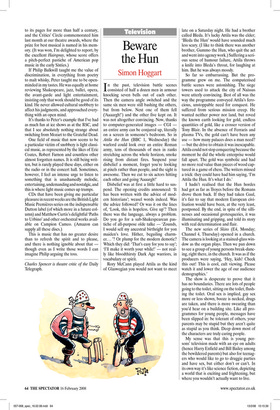Beware the Hun
Simon Hoggart
In the past, television battle scenes consisted of half a dozen men in armour knocking seven bells out of each other. Then the camera angle switched and the same six men were still bashing the others, but from below. Next one of them fell (‘Aaaargh!’) and the other five kept on. It was not altogether convincing. Now, thanks to computer-generated images — CGI — an entire army can be conjured up, literally on a screen in someone’s bedroom. So in Attila the Hun (BBC 1, Wednesday) the warlord could look over an entire Roman army, tens of thousands of men in ranks stretching across the whole horizon, smoke rising from distant fires. Suspend your disbelief a moment, forget you’re looking at pixels rather than people, and the sight is awesome. Then we cut to six actors hitting each other and going ‘Aaaargh!’ Disbelief was at first a little hard to suspend. The opening credits announced: ‘It has been written with the advice of modern historians’; weasel words indeed. Was the advice followed? Or was it on the lines of, ‘Look, this is hopeless. Give up’? Then there was the language, always a problem. Do you go for a sub-Shakespearean pastiche of all-purpose olde talke — ‘Zounds, I would sell my ancestral birthright for yon maiden’s love. Hither, beguiling charmer... ’? Or plump for the modern demotic? Which they did: ‘That’s easy for you to say’; ‘I’ll make it worth your while!’ — not really like bloodthirsty Dark Age warriors, in vocabulary or spirit.
Rory McCann played Attila as the kind of Glaswegian you would not want to meet late on a Saturday night. He had a brother called Bleda. It’s lucky Attila was the elder; ‘Bleda the Hun’ would have sounded much less scary. (I like to think there was another brother, Gummo the Hun, who quit the act and went into agency work.) Suffering a serious sense of humour failure, Attila throws a knife into Bleda’s throat, for laughing at him. But he was always moody.
So far so embarrassing. But the programme grew on me. The computerised battle scenes were astonishing. The siege towers used to attack the city of Naissus were utterly convincing. Best of all was the way the programme conveyed Attila’s ferocious, unstoppable need for conquest. He suffered from serious mission creep. He wanted neither power nor land, but roved the known earth looking for gold, endless quantities of gold, like a crosser version of Tony Blair. In the absence of Ferraris and plasma TVs, the gold can’t have been any use — how many palaces does a man need? — but the drive to obtain it was inescapable. Attila could not stop conquering because the moment he did the whole enterprise would fall apart. The gold was symbolic and had no more real value than pieces of wood captured in a game of chess. The writers missed a trick: they could have had him saying, ‘I’m Attila the Hun. It’s what I do.’ I hadn’t realised that the Hun hordes had got as far as Troyes before the Romans drove them back. If they had taken Gaul, it’s fair to say that modern European civilisation would have been, at the very least, postponed. By the end, in spite of the sillinesses and occasional grotesqueries, it was illuminating and gripping, and told its story with real determination and flair.
The new series of Skins (E4, Monday; Channel 4, Thursday) opened in a church. The camera is looking at a stained-glass window as the organ plays. Then we pan down to see a group of young persons break-dancing, right there, in the church. It was as if the producers were saying, ‘Hey, kids! Check this out! This is cool, cult viewing. Please watch it and lower the age of our audience demographics.’ The show is desperate to prove that it has no boundaries. There are lots of people going to the toilet, sitting on the toilet, flushing the toilet. Oral sex is implied, gay sex more or less shown, booze is necked, drugs are taken, and there is more swearing than you’d hear on a building site. Like all programmes for young people, messages have been slipped in: be tolerant of others, your parents may be stupid but they aren’t quite as stupid as you think. Deep down most of the characters are truly caring people.
My sense was that this is young persons’ television made with an eye on adults (hence Harry Enfield and Bill Bailey among the bewildered parents) but also for teenagers who would like to go to druggie parties and have sex, but either don’t or can’t. In its own way it’s like science fiction, depicting a world that is exciting and frightening, but where you wouldn’t actually want to live.


















































































 Previous page
Previous page